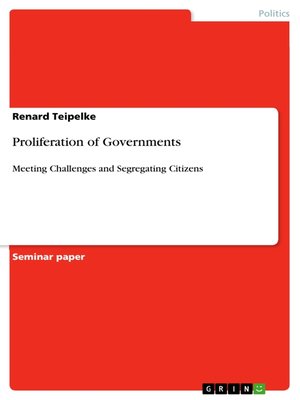
Sign up to save your library
With an OverDrive account, you can save your favorite libraries for at-a-glance information about availability. Find out more about OverDrive accounts.
Find this title in Libby, the library reading app by OverDrive.



Search for a digital library with this title
Title found at these libraries:
| Library Name | Distance |
|---|---|
| Loading... |
Seminar paper from the year 2009 in the subject Politics - International Politics - Region: USA, grade: 1,3, San Diego State University (Political Science Department), course: Urban Politics, language: English, abstract: Over 40 years ago, it was hard to imagine that the most numerous local governments in the United States would be special districts. They outnumber every other form of government and counted 35,052 in 2002. Special districts emerged in California especially after the 1970s, when cities and urban areas formed new local governments. At the periphery of urban areas, residential development with a low density occurred – this 'sprawl' came along with the creation of cookie-cutter suburbs. Special districts were formed to provide a single service for areas, thereby crossing the boundaries of cities and counties. These special authorities played the major role in the proliferation of governments in California which led to fragmentation and decentralization ('political sprawl') (Lecture 10/14/09). In the following essay, I will show that this multiplication of governments in regard to special districts is not per se a critical development in urban politics but rather is the separation of citizens in newly formed municipalities from the socioeconomic problems of urban areas. I will first explain the fiscal crisis and role of Proposition 13 in California (1978). Then, I will outline causes and consequences of the proliferation of local governments. With reference to the example of the Metropolitan Water District of Southern California, I will provide arguments that support my thesis of the important role special districts have. [...]







